Energy poverty is a key factor that keeps disadvantaged communities in extreme destitution. According to Habitat Hungary (2015), 946,000 people could not properly heat their homes during winter due to financial issues. To break this vicious trend, communities have experimented with bio-briquette production to see if it could be an alternative heating source.
As these programmes had been set up independently from each other, no conclusive results were produced on the overall sustainability and efficiency. This project aimed to fill in this gap by closely measuring manufacturing and usage in different communities so that the equipment can be tested and the most efficient processes can be identified. To support the initiative, Badur Foundation provided the necessary equipment (pulp mixer and press) to several partners. In close cooperation with them, we also documented production practices, collected and analysed data and shared best practices across the localities. Our ultimate aim was to find out whether bio-briquette manufacturing can be a standalone and sustainable project to alleviate energy poverty.
We summarised the lessons learnt in a Manual (in Hungarian) that you may download here. If you have further questions or would like to start producing bio-briquette in your community, please do not hesitate to contact us via email or telephone.
Past and current partners:
Association of Roma Minority Representatives and Spokespeople of Nógrád County, Mátraverebély
Jai Bhim Triratna Buddhist Network, Sajókaza
Jánoshida Municipality, Jánoshida
Mahajáná Foundation, Csörög
Pearl Foundation, Told




